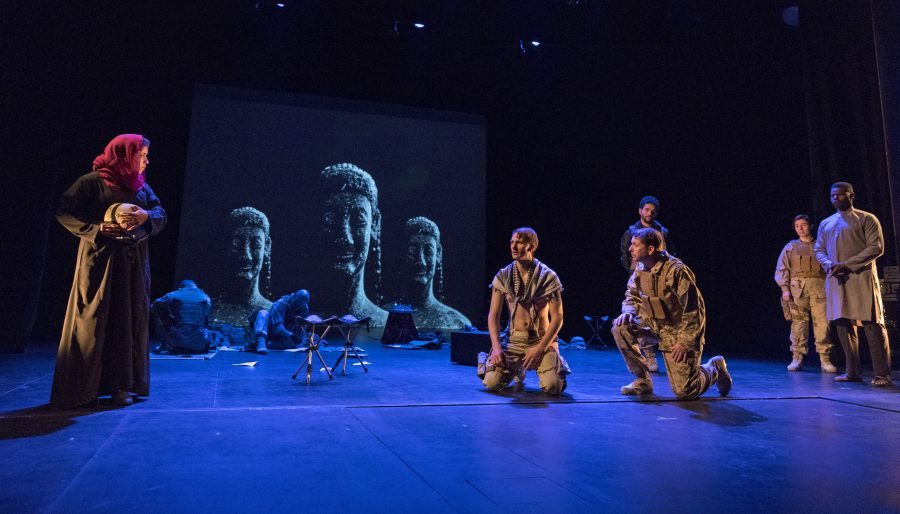

“What we need in the United States is not division; what we need in the United States is not hatred; what we need in the United States is not violence and lawlessness, but is love, and wisdom, and compassion toward one another.” So said Robert F. Kennedy, almost exactly 49 years ago, but he could just as easily have been speaking to a modern audience.
In Our Trojan War, the above statement – masterfully delivered by Ryan Wuestewald – concludes the play, tying together the themes of leadership, hospitality, understanding, and democracy that run through the work.
Directed by Desiree Sanchez at the BAM Fisher Theatre in Brooklyn, Our Trojan War is produced by Aquila Theatre and The Warrior Chorus. An initiative sponsored by The National Endowment for the Humanities, The Warrior Chorus trains veterans to create and perform plays based on ancient literature. Our Trojan War developed from a group reading of The Odyssey, and the play presents excerpts from ancient Greek texts side by side with modern day experiences of veterans.
When a group of U.S. soldiers in the Middle East stumble upon a library of ancient volumes in a house they’re searching, the stories of Achilles, Oedipus, Odysseus, and others prompt them to reevaluate their definitions of leadership, knowledge, war, and democracy. Thanks to a perceptive script, a changing projected backdrop, and expert staging and lighting effects, the play alternates seamlessly between ancient Greek stories and the present day.
The scenes set in ancient Greece are adapted and acted with an immediacy that isn’t usually synonymous with texts like The Iliad. In fact, I was surprised at how natural and engaging the dialogue felt – it never came off as antiquated. Agamemnon and Achilles could easily be two modern soldiers arguing over a prize – and that’s the whole point.
As J. B. Becton’s character so aptly points out in Our Trojan War, ancient literature “holds a mirror up to nature. And that knowledge is power.”
I want to say that every American needs to see Our Trojan War. (I can think of one person in particular who might benefit, but I’m sure he’s got more important things to do at the moment.) Watching it, I found myself thinking about the refugee crisis, racial tensions in America, the recent election, divisions between political parties, and our current government, among other things.
After the performance, the audience was invited to participate in a talkback with a group of panelists. A talkback on a relevant topic follows each night’s performance, and I’d strongly encourage you to stay for it, as it was almost as engaging as the play itself, and helped me realize how some of the work’s themes translate to everyday life.
Our Trojan War is theater as the Greeks intended it, and as all truly great theater should be: a method of beholding, a tool for seeing more clearly, a mirror to hold up to our society, and to ourselves.